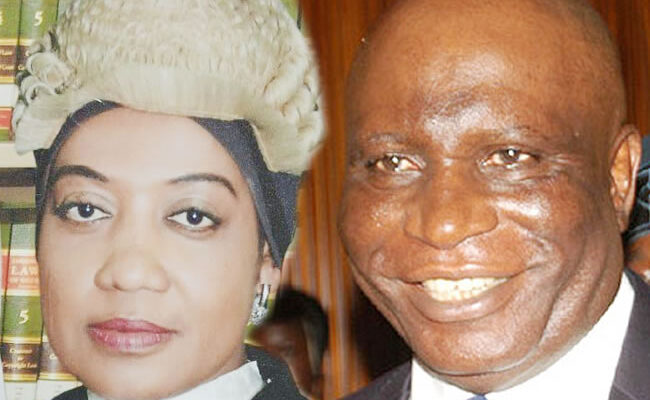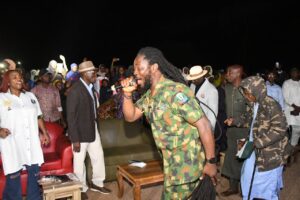
LANRE ADEWOLE and YEJIDE GBENGA-OGUNDARE examine the possibilities and probabilities as election disputes seem to head for courts.

Since Nigeria began presidential democracy, no election, no matter how disputed, has ever been overturned by the judiciary, constitutionally-positioned as the final arbiter in election disputes. The closest to such a historic moment was the adjudication of the 2007 presidential contest spurred by then- candidate of the All Nigeria Peoples Party and now-president, Maj. Gen. Muhammadu Buhari (retd), against the election victor, now-late President Umaru Yar’Adua. A seven-man panel of the Supreme Court, on Friday, December 12, 2008 gave Yar’Adua a thin majority of four “yes” to three “no”, narrowly missing the history of making the first president from its courtroom. The kernel of the matter then, was alleged massive electoral heist, allegedly perpetrated by then-ruling Peoples Democratic Party (PDP) which sponsored Yar’Adua and INEC of the time.
Despite his harrowing loss, one outstanding triumph of the Buhari challenge was proving that non-compliance with the Electoral Act in the processes of conducting elections, could vitiate the entire outcome. He succeeded in proving the 2007 election was conducted in substantial non-compliance with then-Electoral Act of 2006, at the Court of Appeal. Interestingly, INEC did not appeal that ruling at the Supreme Court, making it a decision of the court till date.
The violation was considered so serious and fundamental, that Justice George Oguntade (retd.), in the lead dissenting judgment of the apex court held, “The ballot paper is the live wire, the heartbeat and the engine room of any election. Without ballot papers being serialised and bound in booklets, as required by Section 45(2), it becomes possible to print fake ballot papers which can then be introduced into the ballot boxes fraudulently.”
Section 68 Challenge.
Last weekend’s presidential and national assembly elections have presented another opportunity for history, for the judiciary, especially the apex court. Apart from the electronic evidence of alleged manipulation of the presidential election in many areas of the country that have already littered the social media space and the internet, forcing many local and international observers to score the poll low on credibility, one sticking point for the conduct of the election, is the issue of BVAS and the computation of real-time results on the server of the Independent National Electoral Commission (INEC). The commission threw the entire process into a web of theories when it failed to upload the presidential election results straight from BVAS as required by the Electoral Act, despite doing same for results of the legislative contests. The result collation has now been hit by crisis and those disputing it, especially the Labour Party and the Peoples Democratic Party, are being encouraged to plead their case with the Judiciary.
United in their call for the discontinuance of the election result, opposition parties have queued behind PDP’s claim that INEC has substantially violated Section 64 (4) of the Electoral Act, 2022, on the direct transmission of the election results from the Polling Unit to the INEC Server/Website as required by law.
The Section provides thus: “A collation officer or returning officer at an election shall collate and announce subject to his or her verification and confirmation that the votes stated on the collated result are correct and consistent with the votes or results recorded and transmitted directly from Polling Units under Section 60 (4) of this Act.”
The main opposition party went ahead to claim that, “the integrity of this election has been compromised and vitiated by the admission of INEC officials that there was a technical glitch in the midst of the election which affected the effective functioning of the BVAS machines. Information at our disposal indicates that INEC deliberately refused to commence the process of announcement of results more than 48 hours after the close of election and collation of results from the various Polling Units, which result by law, was expected to be transmitted directly into INEC Server/Website as provided for under Section 68 of the Electoral Act, 2022.”
Section 47, 48 Contestation.
In his famous letter of Monday February 27, former President Olusegun Obasanjo raised the alarm that the weekend poll had not been conducted in substantial compliance with the Electoral Act, in many parts of the country, calling on INEC to cancel and repeat the process. He was making a particular reference to Polling Units where BVAS machines allegedly didn’t function as required and voting still reportedly took place and results generated. His letter generated a national reaction, dividing the country in the middle. While the issue of substantial compliance he raised hadn’t really been faulted, his open endorsement of the presidential candidate of the Labour Party, Mr. Peter Obi, has drawn his observation into the political arena.
Section 47 of the Electoral Act provides;
(1) A person intending to vote in an election shall present himself with his voter’s card to a Presiding officer for accreditation at the polling unit in the constituency in which his name is registered.
(2) To vote, the presiding officer shall use a smart card reader or any other technological device that may be prescribed by the Commission, for the accreditation of voters, to verify, confirm or authenticate the particulars of the intending voter in the manner prescribed by the Commission.
(3) Where a smart card reader or any other technological device deployed for accreditation of voters fails to function in any Unit and a fresh card reader or technological device is not deployed, the election in that Unit shall be cancelled and another election shall be scheduled within 24 hours if the Commission is satisfied that the result of the election in that polling Unit will substantially affect the final result of the whole election and declaration of a winner in the constituency concerned.”
Section 48 then comes in with some empowerment, providing that, “A candidate or a Polling Agent may challenge the right of a person to vote on such grounds and in accordance with such procedures as are provided for in this Act.”
Imminent historic legal battle?
The tussling over substantial compliance with the laws guiding the conduct of the presidential election has become a major talking point in the legal community, even as the political arena is being consumed by it. Ultimately, the gladiators are expected to retire to the Judiciary, to ventilate their disapproval of the exercise, as admonished by many local and foreign monitors and observers.
Thabo Mbeki, a former president of South Africa and leader of the Commonwealth Observer Group, in a statement on Monday, encouraged those dissatisfied with the conduct of the poll, to explore legal channels, instead of resorting to violence.
While the eventually winner and losers of the poll are sorting out their legal issues, public advocacy lawyers, have also been speaking from different perspectives.
Popular rights lawyer, Inibehe Effiong, in a social media post on Monday brought another dimension to the controversy over the electronic transmission.
His post read, “By virtue of Section 60 (5) of the Electoral Act 2022 and Clause 38 of the Regulations and Guidelines for the Conduct of Elections, 2022, Presiding Officers must transmit results to the INEC Result Viewing Portal on completion of elections.
“Failure to comply is a criminal offence. A presiding officer that violates this requirement is liable on conviction to a fine of N500,000 or imprisonment for a term not less than six months. This is how important the issue of electronic transmission of results to the INEC Result Viewing Portal is, under the law” he pointed out.
Time for unprecedented precedent?
The Court of Appeal, serving as the Presidential Election Petition Tribunal, says it is prepared to entertain disputes arising from the weekend poll and has a secretariat already open in anticipation of parties, bringing forth their complaints and defence. However, the President of the court, is yet to make public the panel that will handle what is expected to be the first judicial leg of seeking redress, as criticism mounts over INEC’s alleged non-compliance with critical provisions of the guiding Act. In keeping with tradition and history, the resolution of the dispute at the lower court, is expected to be challenged at the apex court.
The 2007 panel of the ultimate court, till date, remains the most radical and somewhat progressive and closest to giving the country an unprecedented precedent. Two of the panel members; Justice Maryam Aloma Mukhtar and Walter Onnoghen, went on, to become Chief Justice of Nigeria, though Onnoghen as CJN, was ironically terminated by Buhari, now as president, who was the beneficiary of the equally-unprecedented minority judgement.
The current leadership of the apex court under Justice Kayode Ariwoola has professed its desire for reforms and a departure from the recent past of technical justice. Ironically, it has been regularly buffeted for perceivably going more for technicality in place of justice and merit, in resolving pre-election matters, thereby rendering most of its recent pronouncement questionable.
The decision of the government of the United States of America to place a visa ban on some of the justices of the court, including the next-in-line to become the CJN, Justice Kudirat Kekere-Ekun, has further lowered the apex court in the estimation of the Nigerian public.
But can this be a window for redemption?
Popular rights lawyer, Ugovhukwu Osuagwu Esq, says why not, if the evidence is overwhelming, noting, “It is difficult to say if presidential election can be overturned or not . However if there is clear evidence of infractions of the Electoral Act and other Laws regulating the elections why not? Most importantly parties must eschew violence.”
For a former Bar chairman of Ikeja Branch, Dave Ajetomobi, it is possible to reverse the disputed poll but the burden would be huge.
He said, “Obasanjo is a party to the election though indirectly because he has endorsed a candidate in the person of Peter Obi. His words should be considered in that light. I believe that if credible evidence is led by the aggrieved parties, it’s possible for the tribunal to reverse the verdict but the burden is huge!
“Ironically it was Obasanjo that conducted the 2007 election that was acknowledged generally as one of the lowest points in our democratic experiment. Even the beneficiary of Obasanjo’s (alleged) fraud, the late President Yar’Adua acknowledged the flaws in the election and promised to do something about it. “Obasanjo is not a believer in free and fair election especially when his sworn enemy seems to be having an upper hand. Baba is indirectly calling for a coup,” said Ajetomobi.
Like Ajetomobi, Senior Advocate of Nigeria, Chief Yomi Alliyu has no love for Obasanjo, but says INEC can still cancel the election on its own.
Quoting him, “By now we should be conversant with losers’ protest including Gen. Obasanjo. He too has a candidate in Labour making his comments partisan! No court, save the Presidential Election Petition Tribunal, has jurisdiction over presidential election. This is in accordance with the Electoral Act and the Constitution. Aggrieved parties should go to that Tribunal.
“Also, Section 65 of the Electoral Act gives INEC seven days to decide whether or not it will cancel an election for non compliance with the Act and its regulations. This has to be done after final collation and interrogation of the results with its BVAS.”
Buhari’s word on marble.
At a press conference on Friday, December 12, 2008, after the Supreme Court, in a split verdict of 4-3, threw out the petitions of the ANPP on the 2007 presidential election, an apparently disappointed Buhari fulminated, “This judgment is overtly perverse in the sense that it was agreed by all parties in chambers in the lower court that depositions would be accepted without oral testimony. For the courts to now turn around and conclude that there was no evidence is squalid in the extreme.”
READ ALSO FROM NIGERIAN TRIBUNE







